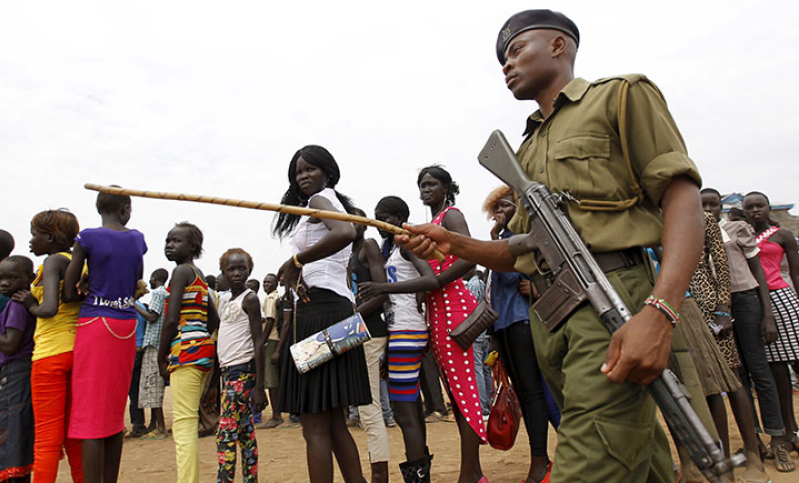
Two pastors and seven other Christians in Sudan were detained for four days last week after trying to stop a group of civilians and police from taking over their school, according to one of the arrested pastors. Local police on Oct. 6 arrested the Rev. Samuel Suliman, headmaster of the Evangelical Basic School in Madani, Al Jazirah state, and the Rev. Zakaria Ismail, both of the Sudan Presbyterian Evangelical church, along with the seven other school staff and local church members. Arrested on the school premises, they were held until Sunday (Oct. 9), Pastor Suliman said.
They were released after paying a total of 30,000 Sudanese Pounds (US$4,870) in bail, accused of resisting authorities in refusing to hand over the school, he said.
The attempt to take over the school came on Oct. 4, two days before the arrests. Some of the civilians involved in trying to take over the school came from Sudan's capital city of Khartoum, 166 kilometers (102 miles) west, to the eastern city of Madani, capital of al Jazirah state, Pastor Suliman said."Things are still difficult, as many pupils and their guardians are not happy with what has happened," he said.
The students' parents have voiced concern over their children's future and have urged the government to allow the school to continue to provide classes, he added.
Ismail is pastor of the church to which the school belongs and is also a representative of the Evangelical Communion, which oversees the property.
The raid marked the second time in a month that police arrested school personnel. Armed police and officials from the National Intelligence and Security Services (NISS) on Sept. 5 arrested Pastor Suliman and 12 teachers at the school, accusing them of supporting the Sudan People's Liberation Army-North (SPLA-N), a rebel group fighting government forces farther south in the Nuba Mountains state of South Kordofan.
Pastor Suliman has strongly denied the charge.
In the Sept. 5 raid, police presented a letter from the National Ministry of Guidance and Endowments, addressed to the State Ministry of Social Welfare, ordering the handover of Evangelical Basic School to the government, he said. The school serves more than 1,000 students, ages 3 to 18, in Madani. Established by the American Mission in 1901, it belongs to the Sudan Presbyterian Evangelical Church.
Harassment, arrests and persecution of Christians have intensified since the secession of South Sudan in July 2011. The Sudanese Minister of Guidance and Endowments announced in April 2013 that no new licenses would be granted for building new churches in Sudan, citing a decrease in the South Sudanese population. Sudan since 2012 has expelled foreign Christians and bulldozed church buildings on the pretext that they belonged to South Sudanese.
Sudan fought a civil war with the South Sudanese from 1983 to 2005, and in June 2011, shortly before the secession of South Sudan the following month, the government began fighting a rebel group in the Nuba Mountains that has its roots in South Sudan. The rebels in the Nuba Mountains were formerly involved with the southern Sudan People's Liberation Army (SPLA) forces fighting Khartoum before the 2005 Comprehensive Peace Agreement (CPA).
Fighting between Sudan and South Sudan broke out in June 2011, when Khartoum forcefully attempted to disarm the SPLA-N in South Kordofan by force rather than awaiting a process of disarmament as called for in the CPA. When the CPA was signed in 2005, the people of South Kordofan were to vote on whether to join the north or the south, but the state governor suspended the process.
Ethnic Nuba, along with Christians, face discrimination in Sudan, where President Omar al-Bashir has vowed to adopt a stricter version of sharia (Islamic law) and recognize only Islamic culture and the Arabic language.
The Nuba people have longstanding complaints against Khartoum - including neglect, oppression and forced conversions to Islam in a 1990s jihad - but as Sudanese citizens on the northern side of the border, they were never given the option of secession in the 2005 peace pact between northern and southern Sudan.
Due to its treatment of Christians and other human rights violations, Sudan has been designated a Country of Particular Concern by the U.S. State Department since 1999, and the U.S. Commission on International Religious Freedom recommended the country remain on the list in its 2016 report.
Sudan ranked eighth on Christian support organization Open Doors' 2016 World Watch List of countries where Christians face most persecution.







